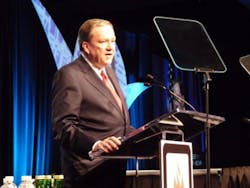LAS VEGAS -- The NFPA, long known as Sparky's home and the organization that establishes codes and standards on a myriad of issues, is facing its biggest challenge ever.
NFPA President Jim Shannon told people attending the annual convention that the internet has helped boost, but also is affecting the organization immensely.
"Last year, NFPA had over 6.6 million visits to our website. We have over 27,000 Facebook fans who last year reached over 7.5 million sharing our content with their friends. NFPA's Twitter account has over 13,000 followers. NFPA videos have been viewed a million times on You Tube."
There are NFPA chapters throughout Latin America among others.
But, there's also a downside to the internet as well, he told the audience in Las Vegas.
Shannon added that these are the most challenging.
"The challenge comes because the internet has brought about some new thinking that threatens our ability to charge for codes and standards. Some "free access" advocates argue that whenever a privately developed standard is adopted into law the copyright is extinguished. Their view is that government should be able to give away all codes and standards once they choose to use them and make them available on the internet without restriction."
He said posting the codes violates copyrights.
"There has been one major court decision that agreed with the argument that adopted standards are automatically in the public domain. Last year, in one piece of legislation, the Pipeline Safety Act, Congress included a provision that required that standards used pursuant to the act be posted on the internet. So, we have to face the fact that, along with all of the benefits, the internet also poses a serious threat to our future."
He noted that all the NFPA codes are available to be read. However, they are not allowed to be downloaded or copied without first paying a fee.
Shannon spoke of the importance of that revenue to keep the agency going. Yet, at the same time, the NFPA information will continue to be accessible online.
"I want you to know that we have mounted a vigorous defense of our copyrights. We believe that our argument is compelling and that the system that has allowed organizations like NFPA to operate has served the country and the world very well. We are working aggressively along with other organizations to tell our story in Washington and in the state capitols and, if necessary, we will argue it in court as well."
Shannon implored people to get involved in the effort.
"We have a duty as the stewards of this organization to be aggressive and creative for the cause that has been our sole purpose since the very beginning of NFPA, saving lives and protecting property from fire."
The head of the organization added: "These are big challenges but they come with the biggest opportunities that NFPA has ever been given to advance our historic safety mission. Everything that we do, every standard that we develop, every new idea to reach kids with our public education programs, every time someone in some distant part of the world comes to our website or to our online catalogue for information is in the service of that mission."






